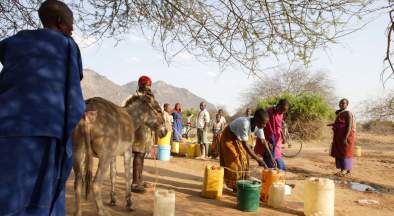What is the vision and mission of your organisation?
The vision of the IUCN is a just world that values and conserves nature. Our mission is to influence, encourage and assist societies throughout the world to conserve the integrity and diversity of nature and to ensure that any use of natural resources is equitable and ecologically sustainable. IUCN has been active in water management for many years. Focusing at the river basin level, IUCN water programmes support innovative demonstration projects designed to apply IWRM approaches in practice based on the principles of: (i) leadership and learning, (ii) economic development and sustainable finance, (iii) good governance and stakeholder participation, and (iv) ecosystem services and water security.
Why did you decide to become a GWP Partner?
IUCN became a GWP partner because of the complementarity of the two organizations focusing on IWRM and the underlying pillars of IWRM. We share the focus of GWP on the coordinated management of water and land resources, the need to maximize economic and social well-being but not at the cost of the environment, and the direct and indirect ecosystem services the environment provides.
IUCN has worked with GWP in many regions and currently has Memorandums of Understanding between IUCN Global Programme in Switzerland and the GWP Secretariat in Stockholm, and in the Latin America and West and Central Africa regions.
What have you found to be the benefits of being a GWP Partner?
First of all access to a wider network of policy makers and influencing organizations, especially regionally. Secondly, mutual view points on many aspects of water management, which also allows for identification of gaps in global approaches and policies for water management. This especially concerns ecosystems and the role they play in providing water, and acting as the sink for wastewater and other pollutants.
What challenges face the management of water resources in your region?
IUCN operates in many river basins across the world. The challenges of sustainable water resource management are increasing as we face climate change impacts and the need to adapt. We also face the increasing complexity of water management, food security and environmental degradation as larger urbanized and coastal dwelling populations require more food and more water, whilst producing more waste. Bioenergy (crops) and dam construction for hydropower-generation increases in response to the need to reduce carbon emissions. This raises concerns over the impact dams have on rivers and the increasing regulation and homogeneity of riverine ecosystems, and the real challenge of understanding the direct and indirect ecosystem services provided by natural freshwater systems. The changes we make to these systems now may make society more vulnerable to climate change impacts in the future.
Actual implementation of IWRM is slow and often dominated by the infrastructure and technical engineering subjects, yet the ‘voiceless’ environment should be represented in line with the pillars of IWRM through greater recognition of ecosystem services and the ecosystem approach to sustainable water management. IUCN’s Water Programme contributes towards the conservation of water biodiversity by promoting, influencing and catalyzing sustainable uses and equitable sharing of resources, as well as protecting ecosystems.
Are there any special projects or initiatives that you would like more widely known?
We would like to specifically promote two main programmes; these are the Water and Nature Initiative, and the Global Environmental Flows Network. The Water and Nature Initiative (WANI) works towards managing and protecting our water reserves and heritage for the future benefit of all. As a global programme, WANI works with governments and local communities to use and manage water resources more sustainably. WANI aims to help reduce poverty and protect the environment by helping people to manage river flows and improving access to all communities.
The Global Environmental Flows Network (eFlowNet) is concerned with water provided within a river or wetland to maintain ecosystems and the direct and indirect benefits they provide for people and the environment. A useful and simple way of thinking about eFlows is that of ‘ecological water demand’, similar to agricultural or industrial water demands. eFlows is effectively a balance between water resources development and the need to protect freshwater-dependent ecosystems.
Further information about IUCN's water programmes
Further information on WANI
Further information on eFlowNet

